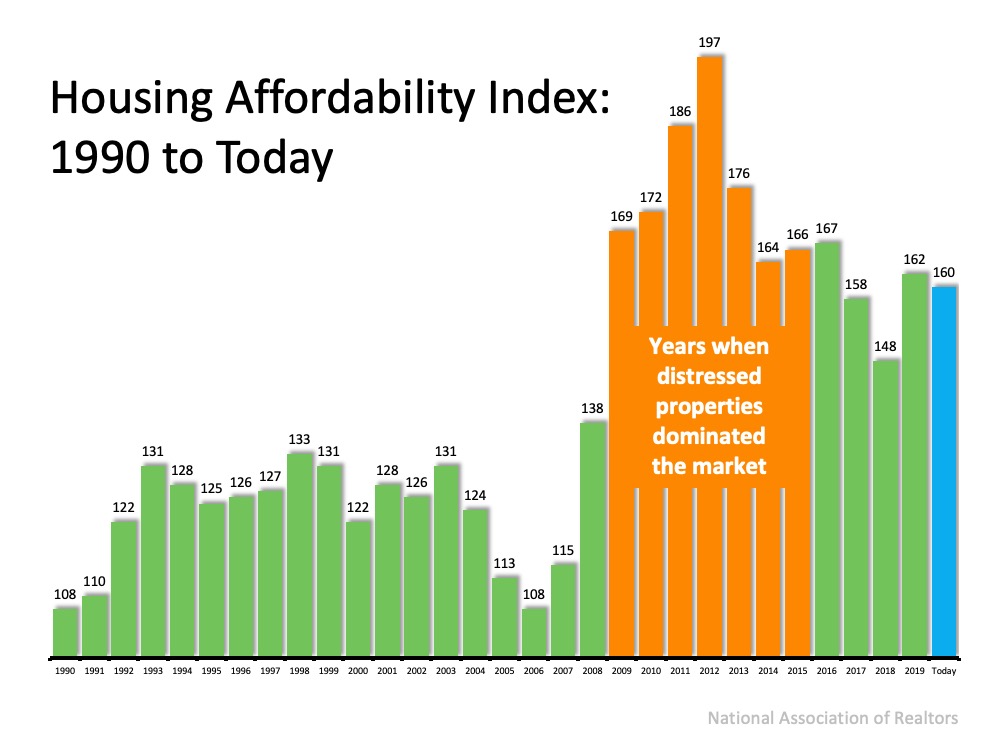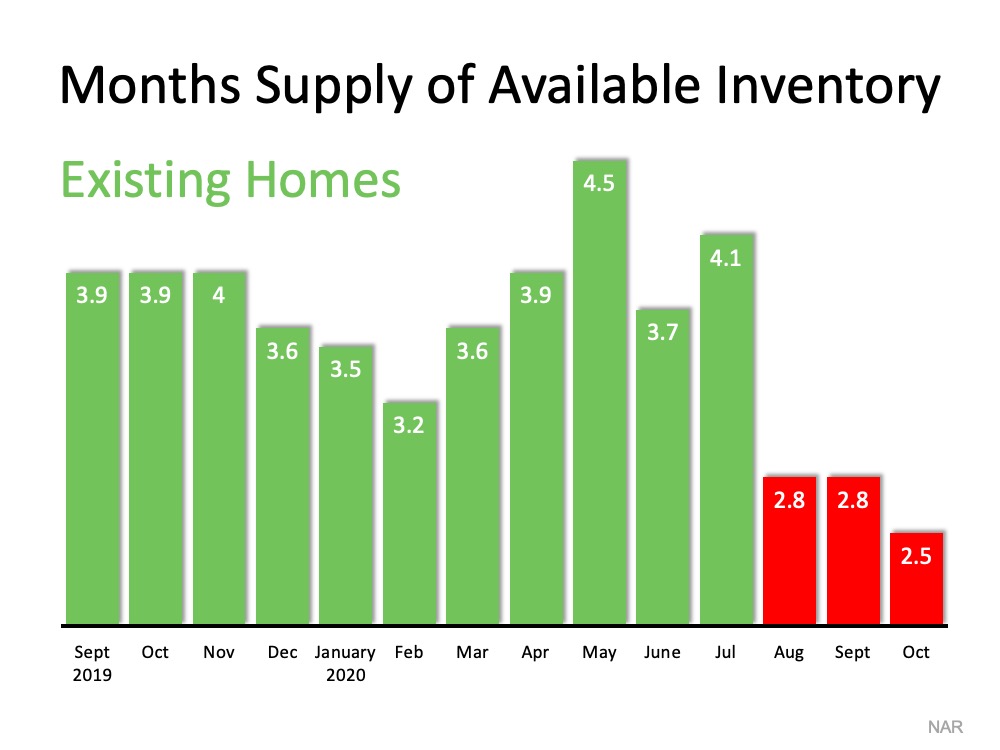With Home Values Surging, Is it Still Affordable to Buy Right Now?

Housing inventory is at an all-time low. Realtor.com just reported that there are 39% fewer homes for sale today than there were last year. At the same time, buyer demand remains strong. In a recent newsletter, research analyst Ivy Zelman explained:
“Although the headwind of severe supply constraints in most markets has contributed to slight moderation in seasonally-adjusted and year-over-year new pending contract growth for two consecutive months (albeit still growing strongly), the underlying strength of buyer demand, particularly for this time of year, remains apparent.”
Whenever there’s a shortage in the supply of an item that’s in high demand, the price of that item increases. That’s exactly what’s happening in the real estate market right now. As a result, home values are surging.
This is great news if you’re planning to sell your house. On the other hand, as either a first-time or repeat buyer, this may instead seem like troubling news. Purchasers, however, should realize that the price of a house is not as important as the monthly cost. Here’s how it breaks down.
There are several factors that influence the cost of a home. Two of the major ones are:
- The price of the home
- The mortgage rate at which a buyer can borrow the funds necessary to purchase the home
How do these factors impact affordability?
The National Association of Realtors (NAR) produces a Housing Affordability Index which takes these factors into account and determines an overall affordability score for housing. According to NAR, the index:
“…measures whether or not a typical family earns enough income to qualify for a mortgage loan on a typical home at the national and regional levels based on the most recent price and income data.”
Their methodology states:
“To interpret the indices, a value of 100 means that a family with the median income has exactly enough income to qualify for a mortgage on a median-priced home. An index above 100 signifies that family earning the median income has more than enough income to qualify for a mortgage loan on a median-priced home, assuming a 20 percent down payment.”
So, the higher the index, the more affordable it is to purchase a home. Here’s a graph of the index going back to 1990:The blue bar represents today’s affordability. We can see that homes are more affordable now than they were from:
- 1990 to 2008
- 2017 to 2018
Buying a home today is just a little less affordable than it was last year, but still very affordable compared to historical housing market trends.
Note: During the housing crash from 2009 to 2015, distressed properties (foreclosures and short sales) dominated the market. Those properties were sold at large discounts not seen before in the housing market.
Why are homes still affordable today?
The number one factor impacting today’s homebuying affordability is record-low mortgage rates. There’s no doubt that prices are on the rise. However, mortgage rates have fallen dramatically. Last week, Freddie Mac announced that the average interest rate for a 30-year fixed-rate mortgage was 2.72%. Last year at this time, the average rate was 3.68%.
If you’re considering purchasing your first home or moving up to the one you’ve always hoped for, it’s important to understand how affordability plays into the overall cost of your home. With that in mind, buying while mortgage rates are as low as they are now may save you quite a bit of money over the life of your home loan.
Bottom Line
At this point, home purchase affordability is still in a historically good place. However, we need to watch price increases going forward. As Mark Fleming, Chief Economist at First American, noted in a recent post:
“Faster nominal house price appreciation can erode, or even eliminate, the boost in affordability from lower mortgage rates, especially if household income growth doesn’t keep up.”
Movers Can Help You Move…And Make A Difference
Winter Will Bring a Flurry of Activity to the Housing Market

In the second half of this year, the housing market surged with activity. Today, real estate experts are looking ahead to the winter season and the forecast is anything but chilly. As Lawrence Yun, Chief Economist for the National Association of Realtors (NAR), notes:
“It will be one of the best winter sales years ever.”
The typical winter slowdown in the housing market is simply not on the radar. Here’s why.
While today’s historically low mortgage rates are expected to remain low, they won’t be this low for much longer. This could be the last chance for homebuyers to secure such low rates, and they’re ready to take action. In a recent article, Bankrate explained:
“If you’re looking to buy a home…expect mortgage rates to remain low into 2021. However, the possibility of rates falling to 2.5 percent or lower has faded as the U.S. economy has rebounded.”
As long as we continue to see low interest rates, we’ll see hopeful buyers on the hunt for their dream homes. Yun confirmed:
“The demand for home buying remains super strong…And we’re still likely to end the year with more homes sold overall in 2020 than in 2019…With persistent low mortgage rates and some degree of a continuing jobs recovery, more contract signings are expected in the near future.”
The challenge, however, is the lack of homes available for sale. With that in mind, all eyes are on homeowners to see if they’ll sell this winter or wait until spring. Danielle Hale, Chief Economist for realtor.com, says it’s best for sellers to capitalize on this moment sooner rather than later:
“We currently see buyers sticking around in the housing market much later than we usually do this fall. If that trend continues, we will see more buyers in the market this winter, too. So, this winter is likely to be a good time to sell.”
With buyers ready to stay active this winter, sellers who want to close a deal on the best possible terms shouldn’t wait until spring to put their homes on the market.
Bottom Line
Experts agree the winter housing market could potentially be bigger than ever. Whether you’re ready to buy or sell, let’s connect today so you can be in your dream home by the new year.
It Pays to Sell with a Real Estate Agent
![It Pays to Sell with a Real Estate Agent [INFOGRAPHIC] | MyKCM](https://files.mykcm.com/2020/11/20140632/20201120-MEM-1046x3014.png)
Some Highlights
- Today, it’s more important than ever to have an expert you trust to guide you as you sell your house.
- From your safety throughout the process to the complexity of negotiating the deal, you need a professional on your side.
- Before you decide to take on the challenge of selling your house on your own, let’s connect to discuss your options.
Homes for Sale Are Rapidly Disappearing

Through all the challenges of 2020, the real estate market has done very well, and purchasers are continuing to take advantage of historically low mortgage rates. Realtor Magazine just explained:
“While winter may be typically a slow season in real estate, economists predict it isn’t likely to happen this year…Low inventories combined with high demand due to record-low mortgage rates is sending buyers to the market in a flurry.”
However, one challenge for the housing industry heading into this winter is the dwindling number of homes available for sale. Lawrence Yun, Chief Economist for the National Association of Realtors (NAR), recently said:
“There is no shortage of hopeful, potential buyers, but inventory is historically low.”
In addition, Danielle Hale, Chief Economist for realtor.com, notes:
“Fewer new sellers coming to market while a greater than usual number of buyers continue to search for a home causes inventory to continue to evaporate.”
One major indicator the industry uses to measure housing supply is the months’ supply of inventory. According to NAR:
“Months’ supply refers to the number of months it would take for the current inventory of homes on the market to sell given the current sales pace.”
Historically, six months of supply is considered a normal real estate market. Going into the pandemic, inventory was already well below this mark. As the year progressed, the supply has was reduced even further. Here is a graph showing this measurement over the last year:
What does this mean if you’re a buyer?
Be patient during your home search. It may take time to find a home you love. Once you do, be ready to move forward quickly. Get pre-approved for a mortgage, be prepared to make a competitive offer from the start, and understand how the shortage in inventory has led to more bidding wars. Calculate just how far you’re willing to go to secure a home if you truly love it.
What does this mean if you’re a seller?
Realize that, in some ways, you’re in the driver’s seat. When there’s a shortage of an item at the same time there’s a strong demand for it, the seller is in a good position to negotiate. Whether it’s the price, moving date, possible repairs, or anything else, you’ll be able to ask for more from a potential purchaser at a time like this – especially if you have multiple interested buyers. Do not be unreasonable, but understand you probably have the upper hand.
Bottom Line
The housing market will remain strong throughout the winter and heading into the spring. Know what that means for you, whether you’re buying, selling, or doing both.
Tips to Sell Your House Safely Right Now [INFOGRAPHIC]
Tips to Sell Your House Safely Right Now [INFOGRAPHIC]
![Tips to Sell Your House Safely Right Now [INFOGRAPHIC] | MyKCM](https://files.mykcm.com/2020/11/12090934/20201113-MEM-1046x1641.png)
Some Highlights
- Your agent now has over 6 months of experience selling houses during the pandemic and can make the process easier and safer for you today.
- COVID-19 protocols and technology usage recommendations from the National Association of Realtors (NAR) are making it possible to sell houses right now, while agents continue to abide first and foremost by state and local regulations.
- Let’s connect to discuss how to sell your house safely in today’s housing market.
Is it Safe to Sell My House Right Now?

In today’s real estate market, the buzz is all about how it’s a great time to sell your house. Buyer demand is high, and there simply aren’t enough homes available to buy to meet that growing need. This means now is the time to make a move so you can close the deal on your ideal terms.
Even in today’s strong sellers’ market, there are homeowners who are choosing not to sell due to ongoing concerns around the health crisis, financial uncertainty, and life in general. According to Zillow, here are the top three reasons homeowners who are thinking of selling sometime in the next three years are not putting their houses on the market right now:
- 34% – Life is too uncertain right now
- 31% – Financial uncertainty
- 25% – COVID-19 health concerns
If you identify with any of these, you’re not alone. Whether it’s the future of your employment situation or simply being uncomfortable having guests in your home for showings, life feels a lot different than it did at this time last year. The good news is, real estate professionals have spent the majority of 2020 figuring out how to sell homes safely, and it’s paying off for those who are choosing to move this year.
Real estate agents are doing two things very well to make selling your house possible:
1. Agents Are Implementing Technology in the Process
While abiding by state and local regulations as a top priority, real estate agents are making sales happen safely and effectively by leveraging key pieces of technology. Agents know exactly what today’s buyers and sellers need and how to put the necessary digital steps in place. For example, agents have capitalized on the technology buyers find most helpful when deciding on a new home:
- Virtual tours
- Accurate and detailed listing information
- Detailed neighborhood information
- High-quality listing photos
- Agent-led video chats
They’re listening to their audience and leveraging the tools that help buyers get an initial look at a home without having to step inside. This helps reduce the number of people entering your home, so only those who are very seriously interested need to take the next step: in-person showings.
2. Agents Are Facilitating Safe and Effective In-Person Showings
After leveraging technology, if you have serious buyers who still want to see your house in person, agents are following the guidelines set by the National Association of Realtors (NAR) and utilizing safe ways to proceed. Here are a few of them, understanding again that the agent’s top priority is always to follow state and local restrictions first:
- Limiting in-person activity
- Requiring guests to wash their hands or use an alcohol-based sanitizer
- Removing shoes or covering them with booties
- Following CDC guidance on social distancing and wearing face coverings
Getting comfortable with your agent – a true trusted advisor – taking these steps under the modern-era safety standards might be your best plan. This is especially important if you’re in a position where you need to sell your house sooner rather than later.
As Jeff Tucker, Senior Economist for Zillow notes:
“Homeowners who feel life is uncertain right now may think they can still get a strong price if they delay selling until they have more clarity. The catch is that waiting to sell may raise the cost of a trade-up. This fall’s record low mortgage rates, which make a trade-up more affordable on a monthly basis, are not guaranteed to last.”
Bottom Line
In this new era in our lives, things are shifting quickly, and virtual strategies for sellers may be your ideal option. Opening your doors up to new approaches could be game-changing when it comes to selling your house while the market is leaning in your favor. Let’s connect so you have your trusted real estate professional (that’s me) to help you safely and effectively navigate all that’s new when it comes to making your next move.
Don’t “Fall” for this Real Estate Myth

Fall is here. Which means the “holiday season” is creeping up on us.
Which, when you’re a real estate agent, inevitably brings questions about whether it makes sense to even list a house for sale, or start looking to buy a house at this point, or…
“Should we wait ‘til Spring?”
If that’s ever crossed your mind, you’re not alone. Lots of people think that way.
But why?
The most common reasons sellers give: there are less buyers looking.
The most common reason buyers give: there aren’t as many houses for sale.
Kind of a self-fulfilling prophecy…but, also kind of a myth.
I don’t have any proof, but I have to wonder if this mindset wasn’t started by part-time real estate agents who wanted down time during the holidays to shop, bake, and go to parties.
It’s a myth I wish truly existed. Because, while there’s certainly busier times of the year, as a full-time agent, I know there’s always great houses being sold and bought. Not just during the season, but even on holidays.
(I’m lucky to enjoy just a few hours on an actual holiday without some amount of work for my clients.)
Spring is a long ways away. And there are plenty of houses to buy…and plenty of buyers to sell to between now and then.
What Do You Think About When I Say July 4th?

Probably fireworks, right?
Okay, maybe you think about barbeques, pool parties, or parades first.
The point is, the first thought for most people isn’t about the nitty-gritty that we’re actually celebrating — our independence as a nation.
Deep down, we all know that’s what it’s all about. And we respect it. But, we’re also human. Who can blame us for enjoying our freedom watching fireworks, without giving all that much thought about everything our founding fathers did to get us here?
So it is in real estate…
There’s a lot of focus on the “fireworks” in real estate. The big, glorious, flashy, exciting moments. Like…
- The moment your house first hits the market.
- Seeing the pictures of your house all over the Internet.
- Throngs of people walking through your first open house.
- Receiving offers from buyers…maybe even multiple offers.
- Going under contract.
- Walking into “the” house, and falling in love with it.
- Making an offer on the house you love, and having it accepted.
- Closing on the sale or purchase of your home.
All really exciting “firework” moments.
But they’re not the full story. There’s a lot of stuff behind the scenes in order to get to those fun, celebratory moments. A lot of thought, knowledge, skill, and work… Not necessarily fun, or sexy stuff. But it’s all important. It’s all necessary to get to those exciting “fireworks” moments.
Not that the behind the scenes stuff should be something you think about. As a consumer, you should enjoy the glorious moments. Leave the nitty-gritty to me.
Just know that there’s more to it than the “fireworks” you want to see when you buy or sell a house.



